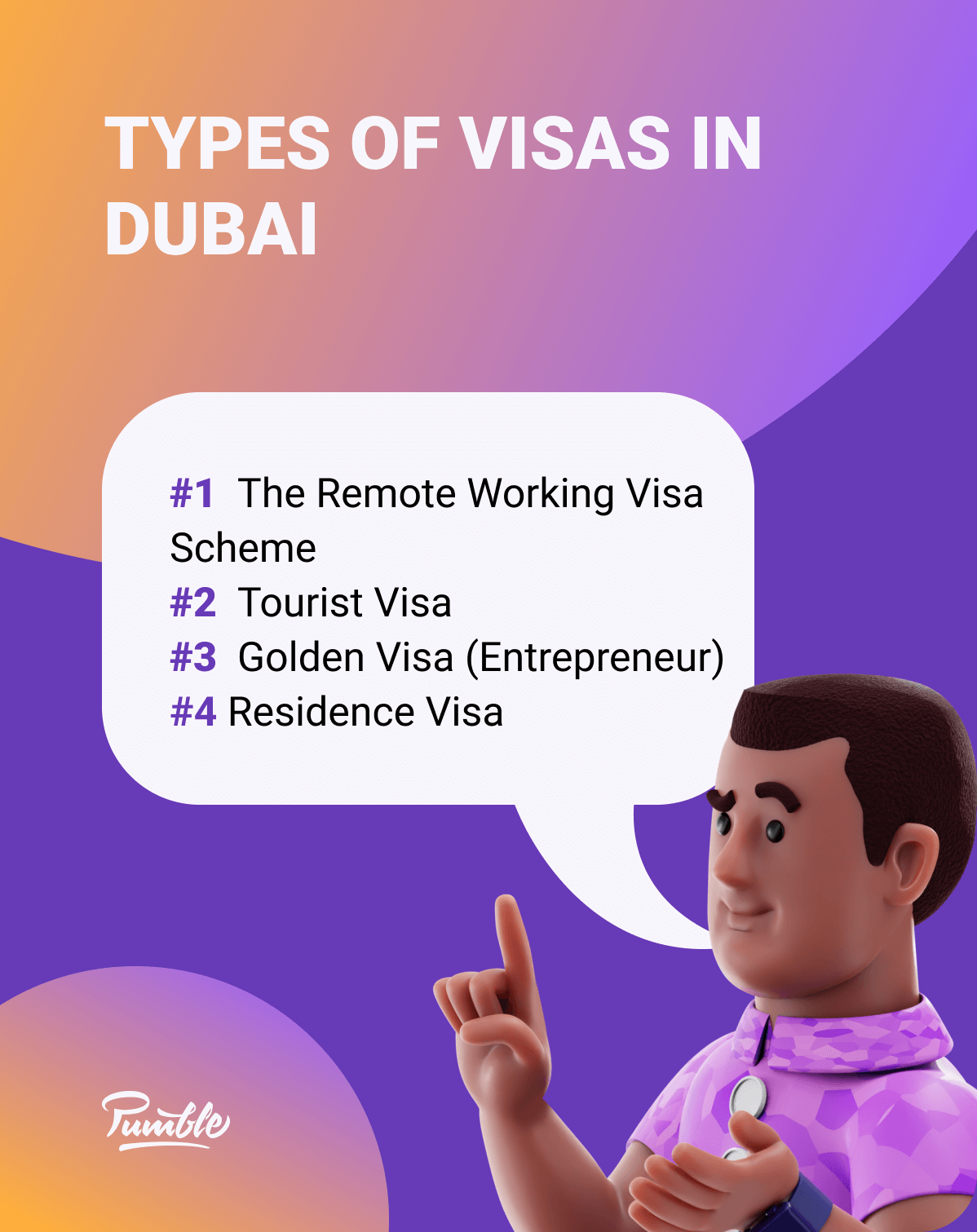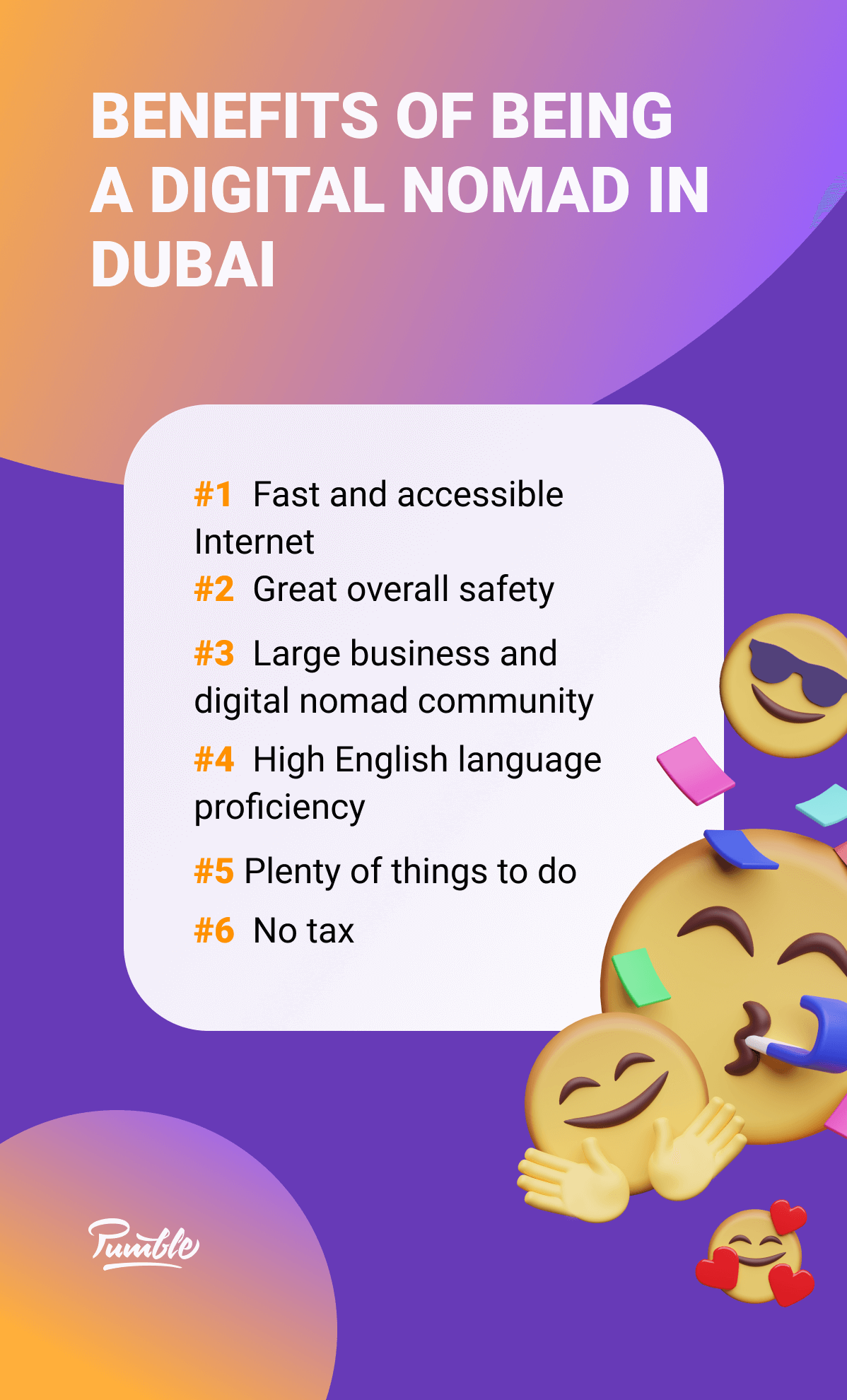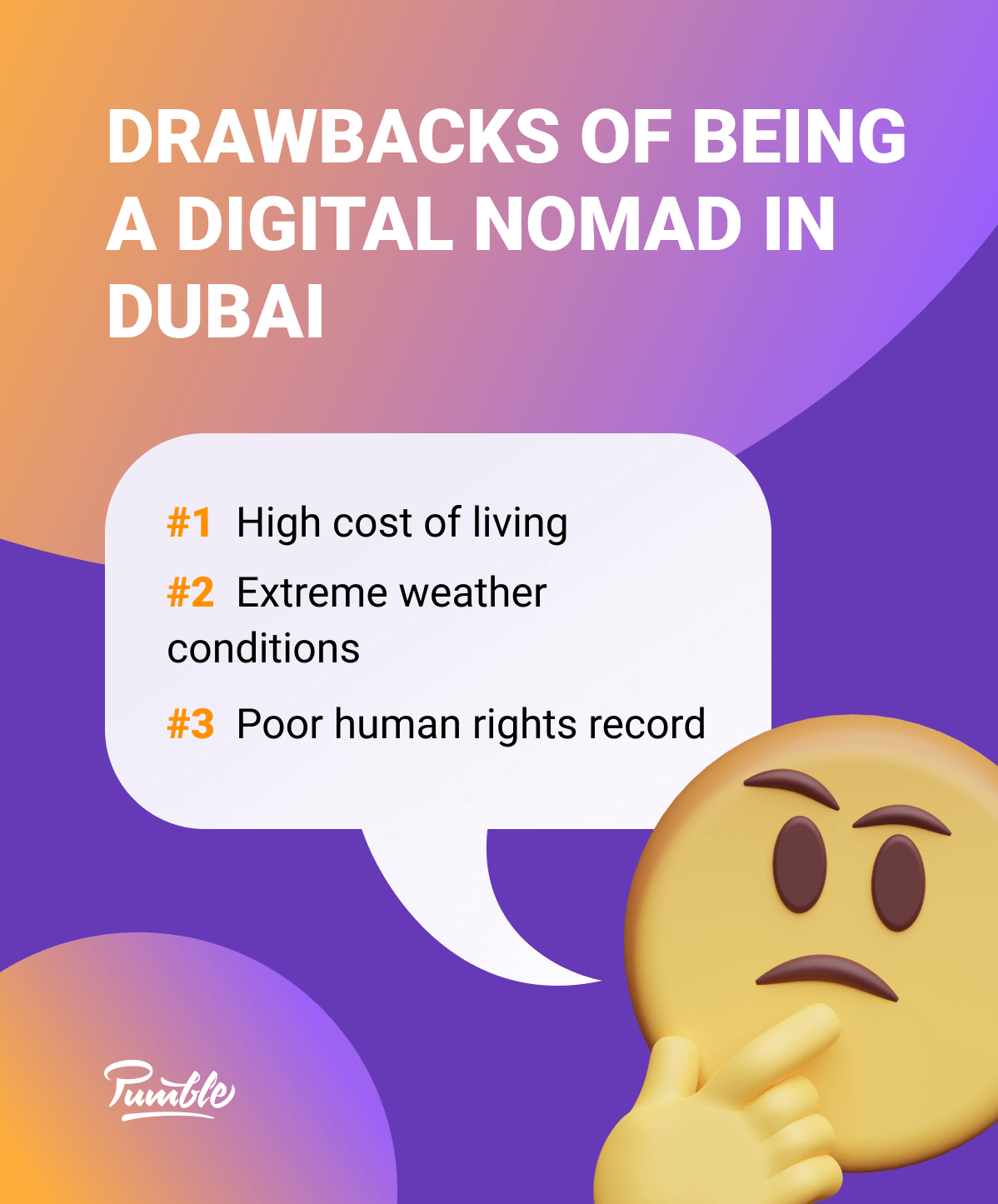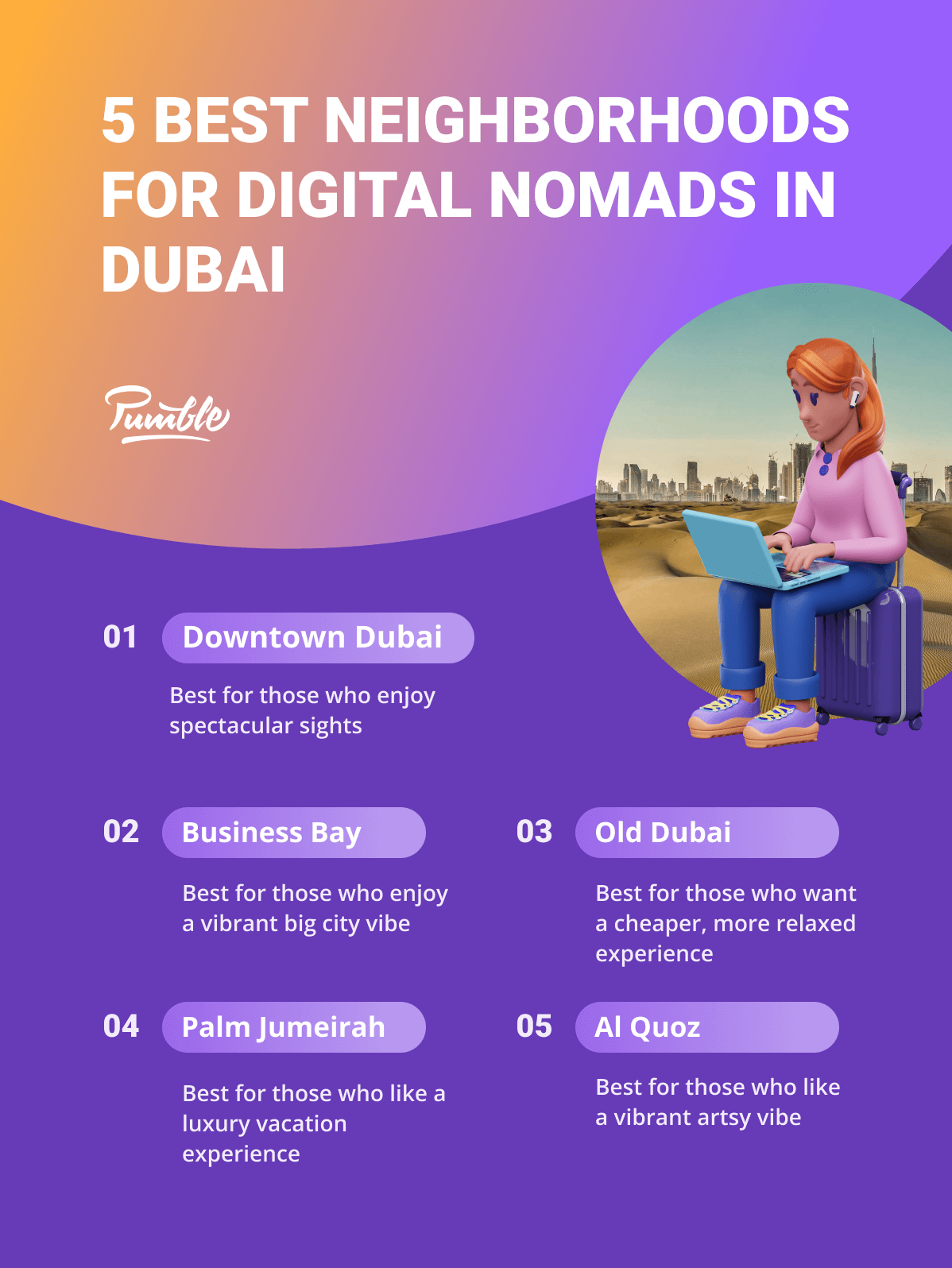Do you want to live as a digital nomad and work remotely tax-free in Dubai — one of the fastest-growing nomadic hubs in the world — while getting immersed in its melting pot of vibrant, diverse culture?
We have some great news for you. Thanks to the Dubai digital nomad visa, you might just get to make this dream a reality.
Read on to find out about:
- The types of Dubai visas available to digital nomads,
- The benefits of the Dubai digital nomad visa,
- The requirements to apply for the Dubai digital nomad visa,
- The pros and cons of being a digital nomad in Dubai,
- The best Dubai spots for digital nomads, and
- Tips for working and living in Dubai.
Let’s dive in!

Quick digital nomad visa facts for Dubai
| Dubai visa questions | Dubai visa answers |
|---|---|
| Does Dubai have a digital nomad visa? | Dubai has a specially designed remote working visa program, the Remote Working Visa Scheme, aimed at digital nomads and remote workers. |
| When was the Dubai digital nomad visa introduced? | The Dubai digital nomad visa was launched in 2021. |
| Who can apply for the Dubai digital nomad visa? | Nationals of any country in the world (other than the United Arab Emirates) who: – Work remotely for a company registered outside the UAE, or own a company registered outside the UAE and – Earn a monthly income of at least AED12,853.75 (~$3,500). |
| How much does a Dubai digital nomad visa cost? | AED2,243.89 (~$611) |
| Dubai’s digital nomad visa length? | Up to 1 year |
| Minimum stay requirement? | 6 consecutive months |
| Possible to extend the visa? | Yes, you can renew your visa if you want to extend your stay. |
| Minimum income requirements? | AED12,853.75 (~$3,500) per month |
| Processing time for visa application? | 30–60 days |
| Can I apply with family members for a digital nomad visa? | Yes, with your spouse and children |
What to expect as a digital nomad in Dubai?
Dubai digital nomad visa offers a unique chance to experience living in one of the most extraordinary places in the world. You won’t find any other place in the world quite like Dubai. Here’s a quick overview of what you can expect as a digital nomad in the UAE’s most populated city:
| Dubai digital nomad FAQ | Dubai digital nomad answers |
|---|---|
| Average Internet speed: | 227.56 Mbps — median download speed 26.04 Mbps — medial upload speed |
| Best coworking space (highest Google rating and highest number of voters): | myOffice, Dubai Marina (4.9 stars from 168 voters) |
| Friendly to foreigners: | Yes — 80% of Dubai population consists of foreign expats, which makes the city exceptionally expat-friendly. |
| Most popular place for digital nomads in Dubai: | Downtown Dubai and Business Bay are the 2 most popular hotspots for digital nomads in Dubai. |
| Weather in Dubai: | – Average annual temperature 28.2°C (82.7°F); – Coldest month average temperatures (January) — 19.4°C (67.0°F); – Hottest month average temperatures (August) — 35.7°C (96.2°F); – 335.4 sunny days; – 25 rainy days; |
| Type of climate: | Desert |
| Annual air quality average: | US AQI — 130 (unhealthy for sensitive groups) PM2.5 — 9.4 times the WHO annual air quality guideline value |
| Average cost of living: | Family of four: AED13,339.6 (~$3,631.8) per month (without rent) Single person: AED3,845.5 (~$1,047.5) per month (without rent) |
| Average coworking space cost: | AED918.12 (~$250) per month |
| Crime per 100k population: | 32.5 |
| Ranking of Dubai’s healthcare system: | 20th place |
| Interesting fact for digital nomads: | There’s no income tax. |
Dubai digital nomad visa
The city of Dubai offers a fairly straightforward digital nomad visa program, called the Remote Working Visa Scheme, as a unique opportunity for anyone who qualifies to come to live in this one-of-a-kind city for a year.
To renew the visa and extend your stay, you’ll have to re-apply using the same application process.
The Dubai digital nomad visa is unique in many ways. However, probably the most important feature, which distinguishes it from almost all other digital nomad visas, is that it’s open to applicants from all around the world, with no nationality restrictions.
What documents do you need to apply for Dubai’s digital nomad visa?
To apply for the Dubai digital nomad visa, you’ll need to submit the following list of documents:
- Passport (valid for at least 6 months),
- Proof of health insurance with the United Arab Emirates coverage validity,
- Proof of payment of processing fees, and
- Attested police clearance certificate from the country of origin.
If you’re an employee, you’ll need to submit:
- Proof of employment from your current employer registered outside the UAE with (at least) a one-year contract validity,
- Proof of a monthly salary of a minimum of $3,500,
- Bank statements for the 3 preceding months, and
- Payslip for the last month.
If you’re a business owner, you’ll need:
- Proof that you have owned the company for a minimum of one year,
- Proof that you earn a minimum monthly income of $3,500,
- Bank statements for the 3 preceding months, and
- Proof the business is located outside the UAE and that work/employment is conducted remotely.
If you’re applying for (a) family member(s), you’ll need to submit proof of payment of processing fees for each family member along with your passport and valid health insurance.
Who is eligible to apply for the Dubai digital nomad visa?
The Dubai digital nomad visa is designed for employees and business owners from around the world who meet the following criteria:
- Professionals that work remotely for a company registered outside the United Arab Emirates,
- Owners of a business registered outside the UAE,
- Employees who have (at least) a one-year contract with the current employer,
- Business owners who have owned a company for at least one year,
- Employees and business owners with a monthly income of at least $3,500, and
- Applicants who have medical insurance with UAE coverage.
Are you eligible if you are a United States citizen?
Yes, you are eligible to apply for the Dubai digital nomad visa as a United States citizen.
As long as you meet all the criteria listed above and submit all the documents, you can apply for the Dubai digital nomad visa.
Without a visa, you can stay in Dubai for 30 days as a US citizen.
Are you eligible if you are a US Green Card holder?
Yes, you can apply for the Dubai digital nomad visa as a US Green Card holder.
Remember, however, that as a US Green Card holder, you’re at risk of losing your Green Card residency if you spend a year outside the US. Therefore, be extra careful if you’re planning to stay in another country long-term as a US Green Card holder.
Are you eligible if you are an EU citizen?
Yes, as an EU citizen, you are eligible to stay and work remotely in Dubai as a digital nomad.
As long as you meet all the requirements and submit all the documents, you can apply for the Dubai digital nomad visa.
Are you eligible if you reside in any other country?
Yes, the Dubai digital nomad visa is open to applicants from all around the world.
As long as you meet all the criteria and submit all the documents, you can apply for the Dubai digital nomad visa regardless of which country you come from.
That being said, Dubai (UAE) Immigration reserves the right to reject any applicant for national security reasons.
How do I get a digital nomad visa for Dubai?
To get a digital nomad visa for Dubai, you can apply in Dubai or from the country you’re currently residing in. You can apply either online or in person, by visiting the accredited service or typing centers.
If you’re applying online, you’ll need to submit your application through the General Directorate of Residency and Foreigners Affairs Dubai (GDRFA) portal.
Steps for applying for the Dubai digital nomad visa online
To apply for the Dubai digital nomad visa online, you’ll need to take the following steps:
- Create an account on the General Directorate of Residency and Foreign Affairs (GDRFA) portal. Directly register at the GDRFA portal and submit your application.
- Fill out the application form. Enter your personal information and fill out all the mandatory fields.
- Submit all the required documents — The scanned copy of your passport, passport photos, proof of income, health insurance, etc.
- Pay the application fees. Once the payment is processed, you’ll receive a confirmation email. The fees for the Dubai digital nomad visa cost AED2,243.89 (around $611) in total. This price includes the application fee, different processing charges, and the cost of the UAE ID. However, it’s important to note that the service fees may vary depending on the data entered in the application form.
- Wait for approval. Once you’ve submitted your application, all that’s left to do is wait for the processing part to be completed. You will get a confirmation email or a call once the application has been processed. The processing time can take anywhere from 30 to 60 days.
- Go to Dubai. When you’ve got your application approved, you can travel to Dubai with your digital nomad visa.
- Arrange a medical check. Once you’re there, it’s best to first do a mandatory medical check, as you have to take one within the first month of your stay.
- Get your biometrics done. When you receive your medical results, you’ll also get a list of offices where you can give your biometrics. After that, you’ll get a stamp in your passport.
- Pick up your residency card. Finally, you’ll receive an SMS on where to collect your Emirates ID or your residency card. Once you’ve received your ID, you can officially start your one-year digital nomad residency in Dubai.
Steps for applying for the Dubai digital nomad visa in person
Alternatively, if you’re already in Dubai, you can apply in person at one of the government-approved AMER service centers. Here are the steps.
- Prepare all the required documents.
- Visit the nearest AMER service center.
- Submit the documents to the service employee.
- Fill out the application form.
- Pay the fees.
- Submit the application.
- Wait for approval.
After you receive the confirmation email or a call, the process will follow the same steps described above.
Can I live in Dubai without a digital nomad visa while working remotely?
Yes, technically you can live in Dubai and work remotely without a digital nomad visa.
The conditions, of course, vary depending on the specifics such as your country of origin.
If you’re a citizen of one of the Gulf Cooperation Council (GCC) countries:
- Bahrain,
- Saudi Arabia,
- Qatar,
- Kuwait,
- Oman, and
- the United Arab Emirates,
you can enter Dubai without a digital nomad or any other visa.
You can stay in Dubai for up to 30 days on a free-of-charge visa on arrival if you’re a citizen of any of the following countries or territories:
- Andorra,
- Australia,
- Brunei,
- Canada,
- China,
- Hong Kong (China),
- Japan,
- Kazakhstan,
- Macau (China),
- Malaysia,
- Mauritius,
- Monaco,
- New Zealand,
- The Republic of Ireland,
- San Marino,
- Singapore,
- Ukraine,
- The United Kingdom and Northern Ireland,
- The United States of America, and
- Vatican City.
You can stay in Dubai for 90 days in total with a multiple entry visa that is valid for 6 months if you’re a citizen of one of the following countries or territories:
- Argentina,
- Austria,
- Bahamas Islands,
- Barbados,
- Belgium,
- Brazil,
- Bulgaria,
- Chile,
- Colombia,
- Costa Rica,
- Croatia,
- Cyprus,
- The Czech Republic,
- Denmark,
- El Salvador,
- Estonia,
- Finland,
- France,
- Georgia,
- Germany,
- Greece
- Honduras,
- Hungary,
- Iceland,
- Italy,
- Kiribati,
- Latvia,
- Liechtenstein,
- Lithuania,
- Luxembourg,
- Maldives,
- Malta,
- Montenegro,
- Nauru,
- The Netherlands,
- Norway,
- Paraguay,
- Peru,
- Poland,
- Portugal,
- Romania,
- Russian Federation,
- San Vincent and the Grenadines,
- San Marino,
- Serbia,
- Seychelles,
- Slovakia,
- Slovenia,
- Solomon Islands,
- South Korea,
- Spain,
- Sweden,
- Switzerland, and
- Uruguay.
Mexican passport holders can stay in Dubai for up to 180 days in total with a multiple-entry visa that’s valid for 6 months.
What other types of visas suitable for digital nomads does Dubai offer?
If you don’t qualify for the Dubai digital nomad visa, you might want to explore other visa options for Dubai that might be a suitable alternative.
Here are 3 other visa options you might consider as a digital nomad in Dubai:
- Tourist visa,
- Golden visa (Entrepreneur), and
- Residence visa.

Let’s get a closer look at all of these visa options and what they entail.
Type #1: Tourist visa
If you want to stay in Dubai for a short term without many legal obligations, you can do so on a tourist visa.
Depending on the country you come from, you can stay in Dubai as a tourist for anywhere from 30 to 180 days.
As mentioned earlier, citizens of the Gulf Cooperation Council countries (GCC) can travel to Dubai without any visa.
Citizens of the UK, USA, Australia, New Zealand, Ireland, and most Western European countries (see the list above) can stay in Dubai on a 30- or 90-day (depending on the nationality) visitor visa granted upon arrival.
If you’re a citizen of another country (such as China, South Africa, Russia, or India), you’ll have to get a pre-arranged UAE tourist visa before arrival. The good news is this process is rather straightforward and it can be done online through various airlines.
To get the pre-arranged tourist visa for Dubai, you have to submit the following requirements:
- Your color photograph,
- A color copy of your passport (valid for at least 3 months),
- The application form,
- Paid visa fees (the prices vary depending on the duration of stay), and
- A copy of your flight ticket.
Type #2: Golden visa (Entrepreneur)
If you’re an entrepreneur with an innovative project idea, you can get a 5-year Golden visa (Entrepreneur) for Dubai.
To be granted this visa, you first need to have your project approved by the Dubai Future Foundation.
The main requirement for this visa type is to draft an “economic project of a technical or future nature based on risk & innovation”.
Once you get your project idea reviewed and approved by a government incubator, all you have to do is:
- Register your account on the General Directorate of Residency and Foreign Affairs (GDRFA) portal,
- Fill out the application form,
- Submit the approval letter from the Dubai Future Foundation,
- Pay the application fees AED2,855 (~$777), and
- Submit your application.
Type #3: Residence visa
With the UAE residence visa, you can stay in Dubai for anywhere between 1 and 3 years, with the option to renew your visa and extend your stay.
Depending on your specific situation and personal and professional circumstances, you can get several different types of UAE residence visas:
- Work residence visa — allowing freelancers and/or self-employed people and skilled employees with an employment contract in the UAE to live and work in the UAE for 5 years,
- Family residence visa — allowing individuals with a valid UAE residence visa to sponsor their family members’ residence visas,
- Residence visa for investors — allowing “investors establishing or participating in commercial activities in the UAE” to stay in Dubai for 5 years, and
- Residence visa for retirees — allowing retirees who meet the criteria to stay in Dubai for 5 years with the option to renew their permit.
The requirements depend on the type of residence visa you apply for. In most cases, work residence visa applicants will have all expenses covered and all documents submitted by the UAE company employing them.
That being said, one requirement that all applicants must meet is to undergo a complete medical check at a government medical institution to be granted a residence visa.
Which Dubai visa type is best for digital nomads?
Considering all the information listed above, we can say that the Dubai Remote working visa is without a doubt the best option for digital nomads looking to settle in Dubai long-term.
Some of the biggest reasons the Dubai Remote working visa qualifies as the best option for digital nomads include the following:
- The Dubai Remote working visa is designed specifically for digital nomads looking to stay in Dubai while working remotely,
- The visa grants you a 1-year stay in Dubai,
- The program allows you to have all the resources and services available to residents,
- The Dubai Remote working visa has a fairly simple and short list of requirements, and
- The visa application process is simple and straightforward, and you can complete everything online.
Of course, in case you don’t meet the criteria for the Dubai Remote working visa, you can always opt for a short-term tourist visa, and/or if you meet the criteria, you can even try for a more long-term residency visa option.
Costs you need to consider as a digital nomad in Dubai
Now that you have decided on the best visa option for you, it is time to break down the costs you’ll have as a digital nomad in Dubai.
The bad news is that Dubai is definitely on the pricey side when it comes to the cost of living, especially in terms of accommodation, transportation, and alcohol prices.
On average, the cost of living in Dubai without rent is AED13,339.6 (~$3,631.8) for a family of 4, while a single person spends around AED3,845.5 (~$1,047.5) on monthly costs without rent.
That said, digital nomads with a decent income and a balanced lifestyle can have a perfectly comfortable experience living in Dubai.
Let’s break down all the most important expenses you’ll have to consider as a digital nomad in Dubai.
Expense #1: Rent (or accommodation)
According to Numbeo, rent is by far the largest expense you’ll have to consider in Dubai, making up 41.2% of your monthly expenses.
For a 1-bedroom apartment in the city center, you’ll need AED7,254.07 (~$1,975.24) per month on average. A 3-bedroom apartment in the same area is around AED12,542.52 (~$3,415.25) per month.
As in any other city in the world, the more affordable accommodation options in Dubai can be found outside the city’s busiest areas. Outside of the city center, you can get a 1-bedroom apartment for around AED4,113.43 (~$1,120.06) per month and a 3-bedroom apartment for about AED7,667.31 (~$2,087.76).
Expense #2: Utilities
On average, monthly utility costs in Dubai are between AED475 and AED1,180.56 (~$129.33–$321.45).
This bill includes:
- Electricity and Water (DEWA bill),
- AC,
- Garbage, and
- Service charges (property management, security staff, cleaning and maintenance services, landscaping, etc.).
Keep in mind, however, that the majority of the price is reserved for electricity and AC.
In most cases, your rent cost will have all the bills already included in the price — especially the AC bill and Service charges. Make sure to check what’s included in your rent with a landlord or agency before you sign the lease contract. For example, the AC bill (as expected) is a huge additional expense to take into account so it’s best to err on the safe side and ask for the list of all expenses included upfront.
For cable or ADSL Internet of 60 Mbps or more with unlimited data, you’ll pay around AED346.27 (~$94.28).
A prepaid SIM card costs anywhere from AED55 (~$14.97) to AED99 (~$26.95), depending on data and voice packages.
Expense #3: Transportation
Transportation is another one of the bigger expenses you’ll need to consider as a digital nomad in Dubai. The city is not really walkable, so you’ll basically have to rely entirely on public and private transportation services to get around.
Luckily, Dubai has an extensive public transportation network with:
- Buses,
- Dubai Metro,
- Dubai Ferry,
- Trams, and
- Palm Jumeirah Monorail.
On top of that, there is Dubai Taxi service, as well as Uber and Careem.
One of the biggest conveniences of transportation in Dubai is the option to use the universal Nol card for any means of transportation in the city.
Of course, the amount you’ll spend on transportation largely depends on whether you’ll use more affordable means of public transportation, rent a car, or go for a more comfortable (but also far more expensive) taxi service.
We spoke to our very own Social Media Specialist, Kristina Nikolic, who used to work and live in Dubai, and she also spent some time in 2023 working remotely from Dubai. Nikolic mentions that the most effective and affordable way to get around in Dubai is to rent (or buy) a car.

“In Dubai (and UAE in general), you might want to rent or buy a car. Gas is cheap, cars are cheap, and it is easier to get anywhere you need to go by car. I would definitely recommend it!”
That being said, here are the average prices for public and taxi transportation in Dubai.
| Public transportation | Public transportation costs in Dubai |
|---|---|
| One-way ticket | AED5.75 (~$1.56) |
| Monthly pass | AED345 (~$93.94) |
| Taxi start (normal tariff) | AED12 (~$3.26) |
| Taxi 1km (normal tariff) | AED3 (~$0.81) |
| Taxi 1-hour waiting (normal tariff) | AED30 (~$8.16) |
Expense #4: Groceries
When it comes to your grocery monthly bills in Dubai, they can be on the pricier or cheaper side, depending on your lifestyle choices and the places you shop at.
If you buy imported products from high-end retailers, you can expect substantial grocery expenses. On the other hand, if you shop for local products at more affordable supermarkets, you can save on your monthly grocery shopping.
As Nikolic highlights, one of the best things about supermarkets and grocery shopping in Dubai is the overwhelming amount of options available:

“With a multicultural community living in Dubai, you will find all types of food and groceries for all nationalities — don’t be surprised if you find your favorite childhood candy in a supermarket in Dubai! There are all fruits and vegetables available all year round! I loved that I had watermelon all year long because at home, we usually have it only during summer for 2 months and that’s it!”
For a rough estimate of grocery expenses in Dubai, here’s a list of average prices of some commonly bought groceries:
| Groceries | Grocery prices in Dubai |
|---|---|
| Milk (1 l or ~34 fl oz) | AED6.99 (~$1.90) |
| Bread | AED5.59 (~$1.52) |
| Water (1,5 l or ~50 fl oz) | AED2.24 (~$0.60) |
| Local cheese (1 kg or 2.2 lbs) | AED39.43 (~$10.73) |
| Chicken fillets (1 kg) | AED31.21 (~$8.49) |
| Red meat (1 kg) | AED39.43 (~$10.73) |
| Tomatoes (1 kg) | AED5.68 (~$1.54) |
| Apples (1kg) | AED8.48 (~$2.30) |
Expense #5: Restaurants and cafes
Dubai is known for having the most expensive price of domestic beer in the world — AED12.37 (~$3.36), so you might expect astronomical bills at restaurants and bars.
However, this isn’t entirely indicative of the expenses you’ll have if you opt to eat out at restaurants and have a couple of (non-alcoholic) drinks here and there. Since Dubai (and the entire UAE) is under Sharia law, it’s understandable that alcohol consumption is not encouraged by any means, which explains the high prices of alcoholic drinks in bars and restaurants where it’s served.
Still, you can have a nice 3-course meal for two at an average to mid-range restaurant for as low as AED161 (~$43.83). Prices in cafes and bars go from AED19.32 (~$5.26) for a cappuccino, while a bottle of Coke or Pepsi is around AED3.90 (~$1.06).
Tips for making the most out of your restaurant experience in Dubai
Nikolic reminds us of another super convenient benefit of living in Dubai — the almost non-stop availability of all restaurants and services:

“Dubai is a city that never sleeps — which means everything is available 24/7. Most markets and restaurants deliver all night long, without charging for delivery in most cases. Malls are open till 2 a.m., and there are always people on the streets walking or driving.”
She also highlighted one of the popular Dubai traditions definitely worth experiencing — the Friday brunch:

“Something of an institution, the Dubai Friday brunch signifies the start of the weekend and its activities. It’s 3–4 hours of unlimited food and drinks. You will be about to tackle an all-inclusive indulgence of food, alcohol, and a lively atmosphere. Expect to pay anything from AED100 (~$27.22) up to over AED400 (~$108.91).”
However, as Nikolic reminds us, during the month of Ramadan — the holy month in the Muslim community — restaurants and cafes in Dubai are only open for takeaway as a sign of respect and support, so be prepared to eat at home during Ramadan.

“Ramadan (Eid al Fitr and Eid al Adha — holy days) is the holy month when Muslims fast and don’t drink or eat anything during daylight. Of course, this religious practice doesn’t apply to non-Muslims. However, nobody eats or drinks in public out of respect (not even chewing gum), and restaurants and cafes are open for takeaway only. Most of the government institutions also have different opening hours during the month of Ramadan.”
Expense #6: Internet
Dubai has great internet speed and coverage throughout the city.
The median download speed of fixed broadband Internet in Dubai is currently 167.50 Mbps, while the median upload speed is 85.35 Mbps.
Of course, this internet speed comes with a pretty high price tag. As mentioned earlier, your monthly internet bill will be around AED346.27 (~$94.28).
Expense #7: Coworking spaces
If you prefer to work in a quiet and productive work environment, you won’t be short of coworking space options in Dubai.
With hundreds of coworking spaces throughout the city offering flexible hourly, weekly, monthly, or quarterly packages, Dubai can accommodate any type of digital nomad out there.
Keep in mind, however, that Dubai is one of the cities with the most expensive monthly hot desk prices in Asia. On average, you’ll spend around $250 per month on coworking space expenses.
Do digital nomads pay taxes in Dubai?
No, as a digital nomad in Dubai, you don’t pay any income tax, capital gain tax, local taxes, or withholding tax.
This is one of the key benefits of choosing Dubai and one of the main reasons digital nomads and expats have been flocking to Dubai over the last decade. The tax-free regime provides a perfect opportunity for digital nomads to make Dubai their more permanent base while they travel around on vacation.
Keep in mind, however, that this doesn’t mean you’re exempt from paying taxes in your country of origin or in the country where your business is registered. The tax laws and regulations of your country of origin still apply to you while you’re staying in Dubai, except that you’re not obliged to prove it to Emirati authorities.
What are the benefits of being a digital nomad in Dubai?
Globally recognized as the city of superlatives, Dubai has been one of the top vacation spots for tourists.
Among other spectacular sights, the city holds world records for hosting:
- The world’s tallest building,
- The world’s largest man-made archipelago,
- The world’s largest observation wheel, and
- The world’s largest indoor gold souk.
However, the most popular tourist spots don’t necessarily translate well to a perfect nomadic location. Oftentimes, over-tourism and crowdedness can get overwhelming when you’re trying to get some peace and quiet for productive work.
Fortunately, Dubai has proved to be an amazing location for digital nomads as well. On top of being extremely safe, the city also offers great infrastructure, good quality of life, and plenty of options for entertainment.
Let’s deep dive into all the benefits of Dubai for digital nomads.

Benefit #1: Fast and accessible Internet
First things first, Dubai has excellent internet speed, plus it offers great Wi-Fi access pretty much anywhere in the city.
Over the last decade, Dubai experienced fast growth in internet and digital infrastructure in general, which helped it secure a place at the top of the international standards in terms of internet coverage and speed.
You don’t have to rely solely on your accommodation and coworking spaces to get your work done, as pretty much any hotel in Dubai comes with a business center with great free or paid Wi-Fi options. Moreover, most malls and cafes around the city also offer great Wi-Fi service, so you’ll be connected on the go.
As we mentioned earlier, Dubai features great fixed broadband internet speed (167.50 Mbps download, and 85.35 Mbps upload speed). However, it has an even faster mobile internet speed. With 210.70 Mbps download and 25.04 Mbps upload speed, Dubai ranks 2nd in global internet speed rankings for some of the world’s largest cities.
Benefit #2: Great overall safety
The second huge reason many digital nomads and expats choose Dubai as their temporary home is that it is one of the safest cities in the world.
It has a total crime rate of 32.5 per 100k citizens, which puts it in the safe cities category, especially if we consider that the majority of these crimes are drug-related offenses. And this doesn’t come as a huge surprise, given the strict laws and punishments the UAE is known for. For instance, even minor offenses such as swearing can cost people a fine, and sometimes even jail time.
People report feeling super safe walking around alone regardless of the time of day or night. Moreover, the Nomad List members who have stayed in the city have ranked it “safe for women”, which is one important aspect of overall safety.
Contributor insights on safety in Dubai
Nikolic confirmed the general opinion on safety in Dubai:

“Yes, Dubai is very safe for female travelers. You won’t have to worry about your safety going out clubbing. What’s more, ladies generally have an easy pass to most nightclubs, and you’ll often spend amazing nights out at bars or clubs without spending a dime, as there are ladies’ nights and happy hours happening all the time in most establishments in Dubai. That being said, I would be mindful around my drinks, as it can happen to have your drink spiked if you leave it unattended in some clubs.”
She elaborates on the overall sense of safety you’ll experience living in Dubai:

“If you leave your valuables unattended in public, you can rest assured that nobody will take your belongings — on the contrary — people will ask around to find the owner if they find a lost item. You will notice a phone on a charger in the middle of a mall or a club and nobody around — that is the level of safety you get accustomed to in Dubai. People are used to leaving their cars unlocked or leaving a wallet at brunch to secure a table while they grab food.”
All in all, you’ll feel super safe living in Dubai as a digital nomad.
Benefit #3: Large business and digital nomad community
The majority of the UAE and Dubai population consists of foreign expatriates, so the city is naturally very welcoming to expats.
Moreover, this also means you’ll have a large community of expats from around the world you can meet and network with.
Dubai is also a large business center with hundreds of world-renowned companies’ branches and plenty of business and networking opportunities.
Speaking of community, Nikolic, our contributor, highlights another key benefit of being a digital nomad in Dubai — getting immersed into its super multicultural environment:

“Dubai is home to a diverse population, with people from various nationalities and cultures living and working together. This will impact your business and social life, broaden your horizons, and change your perspective on various topics.”
Benefit #4: High English language proficiency
As Dubai predominantly consists of foreign expats, you can rest assured you’ll have no communication barriers as most of the people there speak very decent English.
Although Dubai scores moderate proficiency in the EF’s Global English Proficiency Index, you won’t actually experience any difficulties navigating your way through Dubai as a digital nomad using English. Anyone from the business crowd in the business center area to your local greengrocer will speak decent (if not proficient) English, so you’ll have no language barriers whatsoever.
Nikolic agrees and adds that adding Arabic to your language repertoire can be an additional benefit:

“As a digital nomad in Dubai, you will have no problem speaking English only, but knowing some Arabic can get you places with locals.”
Benefit #5: Plenty of things to do
Our next point is both a benefit and a disadvantage. Dubai is famous for its spectacular modern architecture, lively nightlife, and luxury shopping, which makes it impossible to ever get short of things to do and experience.
At the same time, it can get challenging to keep a healthy work-life balance in a city like Dubai that seemingly never sleeps. If you don’t create boundaries and keep a strict schedule, you’ll be overwhelmed trying to see and experience everything at once.
However, if you’re planning on staying on a digital nomad visa for the full year, you should have plenty of time to relax and take on the Dubai adventures one at a time.
Just to give you a couple of ideas, here are some of the most popular things to do in Dubai:
- Going on an overnight desert safari Beduin style,
- Enjoying the view from the world’s largest building at the top of Burj Khalifa,
- Exploring different visions of human evolution through science, technology, and innovation at the Museum of the Future,
- Exploring the Old Dubai and taking a souk walking tour, and
- Taking a yacht tour of Dubai Marina.
Nikolic added a couple of personal favorites to the list of the best things to experience in Dubai:

- “Go horse riding at The Mushrif Park — Experience peace and tranquility on a whole different level,
- Visit the Dubai Global Village — From November to April, you’ll have the opportunity to experience art, culture, and food from all around the world,
- Go stargazing at the Al Thuraya Astronomy Center,
- Start your day relaxing at one of the oldest and most natural public beaches in Dubai — Kite Beach,
- Fly in a hot air balloon over the Dubai desert — The majority of these flights include a hearty breakfast and open-air transport in vintage Land Rovers, and
- Fly a plane simulator at Emirates airline.”
Moreover, if you’re a nightlife enthusiast, you’ll feel at home in Dubai, as the city is well-known for its spectacular club scene. From club-hopping and eating a late-night shawarma to walking along the Dubai Marina, you’ll have plenty of amazing activities to enjoy if you’re a night owl. Moreover, an additional bonus is you won’t have to worry about safety roaming the streets of Dubai alone at night.
Benefit #6: No tax
Finally, let’s not forget that life in Dubai comes with another great perk in the form of no tax. This is probably one of the biggest advantages for digital nomads and a huge determining factor when deciding where to set out for your nomadic adventure.
The majority of countries offering digital nomad visas very much require you to pay taxes. In some cases, there are favorable regimes offered to newcomers, but rarely does any country or region provide an opportunity to enjoy a tax-free regime on top of plenty of other benefits and services already in place.
So, if you’re looking for a temporary home with a more than favorable tax regime, Dubai might just be up your alley.
What are the drawbacks of being a digital nomad in Dubai?
It’s hard to imagine any drawback to living in a city so embellished in superlatives such as Dubai, however, it still has its downsides.
As spectacular and exciting as it may be, life in Dubai is not for everyone. Pretty soon upon arriving there, you’ll notice that the superlatives go in the opposite direction too, especially when it comes to high costs and temperatures, so it’s important to consider these before you start packing for your Dubai nomadic adventure.
Let’s take a closer look at the biggest drawbacks of being a digital nomad in Dubai.

Drawback #1: High cost of living
As you may predict, all of that impressive luxury and spectacular scenery comes with a pretty steep price.
On average, as a single person, you’ll need around AED3,737.87 (~$1,017.8) per month for basic living expenses that don’t include rent fees, which can be quite expensive. A family of 4 will spend about AED12,911.77 (~$3,515.8) per month without rent.
However, Dubai is still cheaper compared to other bigger cities such as New York and London.
Moreover, there are still ways to live on a budget. You can find great apartment deals during the off-season, and you can save a ton on shopping for deals at more affordable prices and taking advantage of super reliable public transportation. Plus, there’s no income tax, which significantly reduces the overall cost of your Dubai nomadic experience.
Drawback #2: Extreme weather conditions
Another great inconvenience about living in Dubai is the climate. Dubai has a hot desert climate with average temperatures over the hottest summer months of 35.7°C (96.2°F). As you can imagine, it can get pretty overwhelming to spend any time outside in Dubai pretty much from May to October.
Of course, one of the ways to work around this is to leave Dubai for a vacation at a location with a more comfortable climate. That is how the majority of Dubai residents, unaccustomed to such weather, cope with the heat, as Nikolic confirms:

“Usually, people go on vacations during summer, whole families with kids, for a month or two, so you will notice fewer crowds during that time. The ones left spend their days at hotel/resort pools (pools are heated during winter and cooled during summer) or in malls, reducing all outdoor activities.”
If you happen to be one of the people staying for the summer, be prepared to weather some extreme shifts in temperatures between inside and outside. Nikolic reminds us of a valuable tip on how to prepare for these occasions:

“Bring a light jacket or scarf to a mall or any indoor place — the temperatures there are often as low as 18°C (64.4°F).”
Drawback #3: Poor human rights record
Unfortunately, Dubai and the entire UAE score low on human rights globally. This is probably the biggest downside to the entire country, which still has a long way to go to improve in this regard.
According to the Freedom House report, the UAE scored only 17 out of 100 in political rights and civil liberties. Some of the most significant points include:
- Lack of democracy,
- No free or independent media outlets,
- There are laws in place to prevent people to express personal views on political or other sensitive topics, and
- Blasphemy is considered a criminal offense.
LGBTQ+ rights in the UAE are virtually non-existent. Gay marriage and homosexuality are illegal, with the latter being regarded as a capital offense punishable by death. There’s no protection against LGBTQ+ discrimination.
Moreover, as the research by Equaldex shows, almost half of Emirati respondents (45%) agree that being LGBTQ+ should be considered a crime.
Although Dubai is a cosmopolitan city open to diverse cultures, with the majority of its population consisting of expats, the UAE, in general, has plenty of work to do toward becoming more inclusive and progressive.
5 Best neighborhoods for digital nomads in Dubai
Now that you’ve learned all about coming to live in Dubai as a digital nomad, as well as the most important benefits and drawbacks of doing so, it’s time to choose your ideal Dubai location to stay at.
As we’ve mentioned before, Dubai is one of the most spectacular cities in the world, and you’ll have an amazing experience pretty much in any neighborhood you pick for your stay. Still, the choice will largely depend on your lifestyle and environment preferences, as each part of Dubai carries a unique atmosphere, as you’ll see below.
So, without further ado, let’s break down the top 5 spots and neighborhoods for digital nomads in Dubai.

Downtown Dubai — Best for those who enjoy spectacular sights
Downtown Dubai is home to some of the most iconic city landmarks such as the world’s tallest building — Burj Khalifa, as well as Dubai Opera, Dubai Mall, and Dubai Fountain.
Living in Downtown Dubai will let you experience all the shine and glory the city is widely known for. You’ll never feel bored or short of fun activities to experience and places to see, such as:
- Enjoying a breathtaking view from the observation deck of Burj Khalifa,
- Taking a refreshing walk along the Burj Park, or
- Having a delicious meal at one of the best restaurants along the Sheikh Mohammed bin Rashid Boulevard, all the while
- Traveling by a unique means of transportation — The Dubai Trolley — the world’s 1st trolley running on hydrogen.
However, keep in mind that all of this glitz and glamor of the Downtown Dubai area comes with a pretty steep price. For example, a 1 bedroom apartment with a spectacular Burj Khalifa view costs up to AED300,000 (~$81,688.23) per year.
Moreover, the Downtown city area is heavily crowded by tourists almost throughout the year. This can be overwhelming and too distracting if you are the type of person who craves peace and quiet during your most productive work hours.
Where to work in Downtown Dubai
Fortunately, there are plenty of coworking spaces to choose from when you need a peaceful place to work. myOffice – Downtown Dubai is currently the best-rated coworking space in this area, according to Google, with 4.8 stars out of 155 votes.
Business Bay — Best for those who enjoy a vibrant big city vibe
If you’re motivated by the hustle and bustle of big urban city life, you’ll feel at home in the Dubai Business Bay area. Although the name of the area suggests a more business-oriented, networking environment, don’t let the name fool you — Business Bay provides a lot more than your regular business area.
Being home to some of the most spectacular buildings and hotel and residential towers — such as Al Habtoor City — Business Bay is famous for its overall luxurious feel. Living in Business Bay means you’ll never get short of amazing rooftop views and world-class restaurants serving diverse and delicious cuisine.
Of course, you won’t lack any opportunity to mingle and network with like-minded people, as Business Bay hosts a thriving business community.
If you get overwhelmed by the sheer noise and the glamorous luxury of Dubai Business Bay, you can take a break and enjoy a more authentic local experience. Explore the sights along the Dubai Water Canal by taking a unique ride on one of the traditional ferry boats — abras. The authentic experience of crossing the creek between Bur Dubai and Deira by abra will cost only AED1 (~$0.27) per ride.
If you’re interested to learn more about the authentic local culture, you can visit the famous La Perle by Dragone — an impressive permanent live aquatic show celebrating the region’s pearl diving tradition.
Digital nomads who enjoy the vibrant big city vibe and luxurious lifestyle will find a perfect place to stay in Business Bay Dubai. However, as in the Downtown area, rent prices in the Dubai Business Bay area are on the higher end, with a yearly rent for a 1-bedroom apartment going up to AED170,000 (~$46,289.99).
Where to work in Business Bay Dubai
Business Bay in Dubai lives up to its name, in terms of the number of great coworking spaces offering ideal conditions for uninterrupted productive work. According to Google, the highest-rated coworking space in Business Bay Dubai is currently the UNBOX Community coworking space, with 4.8 stars out of 65 reviews.
Old Dubai — Best for those who want a cheaper, more relaxed experience
If the loud and busy atmosphere of Downtown and Business Bay in Dubai is not your cup of tea, you might find Old Dubai more suited to your taste.
After all, Dubai is not all futuristic vibe and luxury. If you’re a history and culture enthusiast looking for a more quiet and less expensive digital nomad experience, you’ll find a perfect nomadic base in Old Dubai.
When you’re not working, you’ll probably spend your afternoons and weekends walking and exploring Dubai’s rich cultural history.
Some of the most impressive sights and activities you’ll explore on your cultural tours of Old Dubai include:
- Visiting the oldest building in the city — the Al Fahidi Fort, which dates back to 1781,
- Tasting traditional Emirati cuisine at Arabian Tea House and trying special local blends at the Coffee Museum,
- Discovering the best spices at the widely famous Spice Souk, and
- Exploring the history of Al Shindagha — one of the city’s oldest neighborhoods.
Overall, you’ll find staying in Old Dubai super eventful, yet slower and significantly less expensive than in the city’s most popular spots. For example, a 1-bedroom apartment in Old Town Dubai will cost you around AED80,000 (~$21,783.52) per year, which is significantly cheaper than what you’d pay for the same apartment in the two previously mentioned areas.
Where to work in Old Dubai
Granted, you won’t get the same variety of coworking space options in Old Dubai as you’d get in modern city neighborhoods. However, it’s still not considered a major drawback as there are ways to have some undisturbed time in a quiet setting for deep work. You can either work from your accommodation or lease a hot desk at one of the coworking spaces in a nearby Business Bay area.
Palm Jumeirah — Best for those who like a luxury vacation experience
If your vision for your Dubai nomadic experience resembles more of a luxury vacation vibe, don’t worry, there’s a perfect spot in the city for you too.
The popular Palm Jumeirah is designed for people looking for a 5-star luxury vacation in one of the most iconic man-made island resorts.
The Palm Jumeirah is home to some of the most exclusive hotels and restaurants in the region including Atlantis, the Royal, One&Only The Palm, plus some more affordable 4-star hotel options.
Staying at Palm Jumeirah also comes with an incredible array of the best Michelin-star restaurants as well as plenty of amazing mid-range restaurant options for digital nomads on a budget.
As for the off-hour activities you can expect at one of the most popular neighborhoods in Dubai, Palm Jumeirah offers everything you’d hope for at your best vacation spot, and then some. From the spectacular Aquaventure Waterpark and the Lost Chambers Aquarium to the iconic Nakheel Mall at the heart of the Palm, the area won’t disappoint in the luxury vacation activity options.
Rent prices may be the biggest drawback when it comes to staying at the Palm Jumeirah as a digital nomad, as the average yearly rent for 1-bedroom apartments in this area is around AED200,000 (~$54,458.81).
Where to work in Palm Jumeirah
As one of the best vacation spots in the area, Palm Jumeirah doesn’t actually host any specifically designed coworking spaces per se. However, there are designated areas in almost any hotel on the island perfectly equipped to accommodate any type of digital nomad and remote worker out there, so rest assured you’ll have plenty of amazing working areas if you decide to make Palm Jumeirah your temporary home.
Al Quoz — Best for those who like a vibrant artsy vibe
And, finally, for all the artsy and hipster types out there, you may want to head straight to the Al Quoz neighborhood.
The industrial neighborhood is home to some of the coolest galleries, communities, events, independent boutiques, and cafes in Dubai. So, if you’re a creative looking for a like-minded crowd, you’ll find a welcoming vibrant community in Al Quoz to network and hang out with.
Don’t let the gloomy industrial look of Al Quoz put you off, as there’s a lively and colorful culture right beneath the warehouse facade. Thousands of artists and creatives around the world have brought their ideas and aesthetics, which revived the industrial district and turned it into a melting pot of artistic expression.
Wherever you turn in Al Quoz there’s a performance session, an art gallery, or a creative workshop taking place, so, if you’re into this type of scene, you’ll never get bored living in Al Quoz.
Some of the most popular after-work activities which are definitely worth checking out in Al Quoz include:
- Visiting the iconic contemporary art gallery — Carbon 12,
- Catching a movie at a popular arthouse cinema — Cinema Akil, and
- Taking a break while having some of the Dubai’s most delicious brews at Nightjar Coffee Roasters.
As long as you’re into the whole artistic vibe of this neighborhood, there are not really any downsides to staying in Al Quoz as a digital nomad. Even the apartment options are super cheap compared to other areas. For example, the highest rent you’ll pay for a 1-bedroom apartment in Al Quoz is around AED45,000 (~$12,253.23) per year.
Where to work in Al Quoz
Pretty much the entire Al Quoz area is one huge coworking space full of cafes, work areas, and multi-purpose spaces you can set up your workstation at. However, if you’re looking for a dedicated coworking space area, Techarc. currently has the highest rating according to Google — 4.7 stars out of 261 reviews.
Tips for digital nomads in Dubai
Now that you have a pretty clear picture of what it’s like to live in Dubai as a digital nomad, all that’s left to do is highlight a couple of extra tips you might want to consider before embarking on this nomadic experience.
Here are some additional tips to help you overcome common challenges and get the most out of your Dubai digital nomad experience.
Tip #1: Mind the cultural and social etiquette
Let’s not get blindsided by all the luxury and glamor on display in Dubai. The region is still governed by Sharia law, which comes with a couple of guidelines more on the conservative side.
Although as a tourist or a digital nomad, you may not suffer the same consequences a local would, it’s still important to mind the cultural and social etiquette and show respect towards the country and culture you’re a guest at.
In addition to refraining from public displays of affection, it’s also super important to pay special attention to the dress code before entering any public spaces, especially religious establishments and historic neighborhoods.
We asked our contributor, Kristina Nikolic, for more information on the proper social etiquette in Dubai. Nikolic suggested a couple of general rules of conduct you should follow when living in Dubai as a digital nomad:

“In general, it’s a custom to always stand up when an elder or a high-ranking person walks into the room — it’s a form of respect.
Also, be sure to never refuse Arabic coffee when offered — as well as dates — it is a sign that you are welcome and accepted.
Although service charges are all included in your restaurant bill, it is almost mandatory to tip. A useful rule of thumb is to add around 10-15% of the total bill for tips.
Do not engage in public displays of affection. Holding hands or a kiss on the cheek is probably just about OK, but any more intimate displays of public affection are severely frowned upon.”
Pay attention to how you dress
Nikolic also highlighted paying attention to the appropriate dress code:

“Try to dress decently while staying in the UAE. Swimsuits, shorts, and bikinis are perfectly fine for pools and beaches, but try to cover up as soon as you enter any other public places. That said, even if the bar is on the beach, you won’t be allowed to enter in your swimsuit. You’ll also have to cover up before entering a mosque or any other holy institution in UAE, and women have to cover their heads too.”
Know the proper guest etiquette
Moreover, Nikolic concluded with etiquette rules to obey when being invited to an Emirati home as a guest:

“When arriving at an Emirati home as a guest, remember to take off your shoes at the home entrance, unless you are instructed otherwise.
Make sure to always leave a little bit of food on the plate to indicate you are full, otherwise, it suggests you’re still hungry. Same for drinks, the host will always pour you half a glass as a sign that they will refill it constantly. If you see incense being passed around, it means your meal is over, and you can leave.”
Tip #2: Obey the law
Although the laws are much less strict for expats and digital nomads, and the United Arab Emirates is taking steps toward becoming more progressive in its views and laws, it’s still very much advisable to be extra careful and obey the local laws. Otherwise, you can suffer serious consequences, including jail time, a fine, or even getting deported and having your visa revoked.
Nikolic confirmed some of our suspicions regarding the strict laws you must obey in Dubai, as a digital nomad, tourist, or regular resident.
The first tip she offers has to do with alcohol and drug consumption and possession:

“Do not drink excessively or appear drunk in public. Drinking outside a licensed venue can get you locked up. You will be asked to provide an alcohol license (no jokes, you have to have it, and it is easy to make it). Do not drive under the influence of alcohol at all — UAE has a zero-tolerance policy for drunk driving.
There is also zero tolerance for all kinds of narcotic drugs in the United Arab Emirates. They are prohibited. If you get caught having any traces of drugs in your luggage, clothes, shoes, or on your person, you are headed for jail!”
Moreover, Emirati law also doesn’t tolerate using offensive language or gestures in public, as Nikolic adds:

“Do not swear in public or use offensive gestures. Giving someone the finger or even just sticking out your tongue might be considered rude at home. In Dubai, it can get you jailed. This is particularly worth remembering when driving since even a common hand gesture expressing frustration could potentially land you in trouble.”
Tip #3: Plan a vacation during the hottest months
The heat during the hottest months in Dubai is practically unbearable, especially if you come from places with milder climates and are not accustomed to extreme temperatures.
To navigate this hurdle and make the best out of your digital nomad experience in Dubai, you might want to leave the city for a vacation during August when the temperatures reach their peak, averaging at 35.7°C (96.2°F).
Further reading for digital nomads in Dubai
As comprehensive as this guide may be, it still doesn’t cover every bit of information on Dubai you might need as a digital nomad.
So, to make sure we’ve got you all covered, we’ve compiled a list of additional resources you might find useful.
Here are the sources we recommend you bookmark:
- Visit Dubai — an official hub run by the Department of Economy and Tourism on all things Dubai, including different visa options and investment opportunities and programs,
- Traveling with Kristin — for videos on digital nomads and expats living in Dubai,
- Nomad List and The Nomadic Network — communities of digital nomads living and traveling around the world.
Dubai: A fastest-growing digital nomad destination
Dubai is becoming one of the most sought-after destinations for digital nomads for several reasons.
In addition to offering great internet speed and accessibility, Dubai is also extremely safe and there’s no income tax. It provides a wide variety of settings, activities, and sights for any type of digital nomad out there.
Most importantly, Dubai offers a super straightforward digital nomad visa allowing all nationals to stay and work remotely in Dubai for up to a year.
🎓 Pumble Pro Tip
If you want to explore other options for digital nomads in different countries globally, be sure to check out our digital nomad hub that offers complete guides on digital nomad visas for various countries:
Dubai digital nomad visa guide disclaimer
We hope this Dubai digital nomad visa guide has been helpful and that you enjoyed reading it. Throughout the guide, we have given you various links that might lead you to new interesting data or simply to articles that will expand your knowledge on various Dubai-related topics.
Please bear in mind that our article has been written in Q3 of 2023, so any changes that are made in the Dubai digital nomad visa procedures or laws after that time have not been included.
Before you start the application process, we advise you to consult with certified representatives, lawyers, and institutions that can provide you with all the information needed.
Pumble is not responsible for any negative responses, losses, or risks incurred, should this guide be used without further guidance from legal and other official advisors.
How we reviewed this post: Our writers & editors monitor the posts and update them when new information becomes available, to keep them fresh and relevant. Published: August 22, 2023
Published: August 22, 2023 




